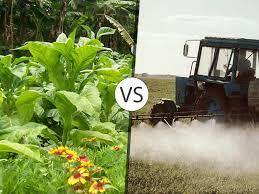Comparing Organic and Inorganic Farming- A Quest for Effectiveness.

Organic farming has gained global prominence, marked by “Certified Organic” signs in farmers’ markets. Despite higher costs, it’s favored for its ecological benefits and adherence to natural cycles and biodiversity. In contrast, conventional farming relies on synthetic inputs like pesticides and GMOs.
The key contrast lies in chemical usage. Conventional methods employ synthetic pesticides and fertilizers, while organics focus on techniques like composting and biodiversity. Organic practices, including crop rotation, maintain soil health, while conventional methods often degrade soil quality. Moral considerations arise, as organic farming avoids antibiotics in livestock. Operationally, organic farmers prioritize system health through diverse techniques, aiming to cultivate biodiversity and restore soil fertility. Environmentally, conventional practices contribute to greenhouse gas emissions, pollution, and health risks. Organic farming champions soil vitality, reduced emissions, and healthier ecosystems. Both approaches converge on aspects like harvesting and water management, but differ in fertilizer use. The choice between organic and conventional farming impacts soil fertility, safety, and the environment.
Consumer choices hold power in shaping farming practices. Opting for organic foods drives change towards sustainable, nutritious, and eco-conscious farming. This collective shift paves the way for a better future.






